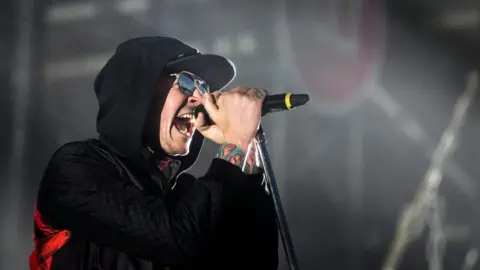How Linkin Park made rap metal memorable
 Getty Images
Getty ImagesLinkin Park singer Chester Bennington, who has died aged 41, changed the dynamics of nu metal with his searingly personal lyrics and musical curiosity.
Linkin Park weren't the first band to fuse metal and rap, but they were the most successful.
Their first album, Hybrid Theory, was certified diamond in the US, representing 10 million sales. Around the world, they sold more than 50 million records.
What set them apart from other nu metal acts like Korn and Limp Bizkit was the vocal interplay between its two frontmen.
Chester Bennington's guttural screams tussled with Mike Shinoda's matter-of-fact rapping in a volatile expression of rage and frustration, while DJ Joseph Hahn framed the band's thrashing guitars with sampled dystopian soundscapes.
Musically, they were miles apart from the sense-dulling artlessness of many of their contemporaries, inspired by contemporary Asia, postmodernism and sample culture. They weren't afraid to show their vulnerability on songs like Numb and In The End.
Linkin Park released a collaborative EP with Jay-Z, and invited grime star Stormzy onto their latest album, One More Light - a brave, if not entirely successful, venture into mainstream pop.
They never swore on record until 2007's Minutes to Midnight (something which boosted their commercial ascent); their lyrics were vivid enough without curse words.
"There's something inside me that pulls beneath the surface / Consuming, confusing / This lack of self-control I fear is never ending," he sang on Crawling, a single from their debut album.
"I tried so hard and got so far," he sang on their biggest hit, In The End, "but in the end, it doesn't even matter."
 Getty Images
Getty ImagesBennington was candid about the dark times that inspired these songs - he was molested as a child, and later struggled with drug and alcohol problems.
"I literally hated life," he told Rock Sound in 2015. "I was like, 'I don't want to have feelings. I want to be a sociopath. I don't want to do anything. I don't want to care what other people feel like. I want to feel nothing.'"
As a result, Bennington often sang as if he was fighting for his life and, sometimes, it felt like he was winning. "Every scar is a story I can tell," he sang on Sharp Edges, released earlier this year.
In retrospect, it's tempting (and easy) to find hints of suicidal thoughts in Bennington's lyrics - but that detracts from the complexity of his writing, which could be fragile and empathetic as often as it was angst-ridden.
Outside of music, he tried to be a force for positivity, too - setting up the fund Music for Relief with the rest of Linkin Park, and playing a range of concerts to raise money for victims of disasters such as Hurricane Katrina and the 2004 tsunami.
On their latest album, the band teamed up with a charity installing solar panels in communities without electricity in Africa, Haiti and Jordan.
The lyrics to the title track, too, saw Bennington reach out to fans suffering depression like his own: "If they say / Who cares if one more light goes out? / Well I do."

Follow us on Facebook, on Twitter @BBCNewsEnts, or on Instagram at bbcnewsents. If you have a story suggestion email [email protected].

